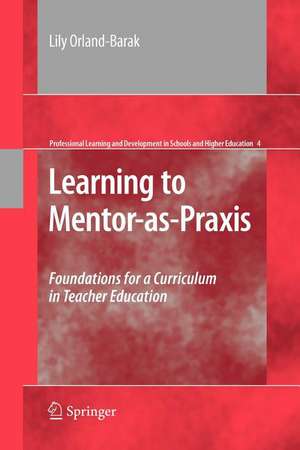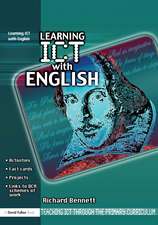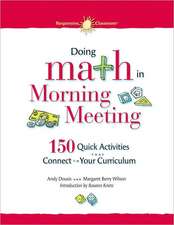Learning to Mentor-as-Praxis: Foundations for a Curriculum in Teacher Education: Professional Learning and Development in Schools and Higher Education, cartea 4
Autor Lily Orland-Baraken Limba Engleză Paperback – 3 mai 2012
| Toate formatele și edițiile | Preț | Express |
|---|---|---|
| Paperback (1) | 638.43 lei 6-8 săpt. | |
| Springer Us – 3 mai 2012 | 638.43 lei 6-8 săpt. | |
| Hardback (1) | 644.63 lei 6-8 săpt. | |
| Springer Us – mar 2010 | 644.63 lei 6-8 săpt. |
Din seria Professional Learning and Development in Schools and Higher Education
- 15%
 Preț: 639.08 lei
Preț: 639.08 lei - 15%
 Preț: 633.19 lei
Preț: 633.19 lei - 15%
 Preț: 648.42 lei
Preț: 648.42 lei -
 Preț: 400.85 lei
Preț: 400.85 lei -
 Preț: 389.88 lei
Preț: 389.88 lei - 15%
 Preț: 649.06 lei
Preț: 649.06 lei -
 Preț: 388.90 lei
Preț: 388.90 lei - 15%
 Preț: 699.93 lei
Preț: 699.93 lei - 18%
 Preț: 887.38 lei
Preț: 887.38 lei - 15%
 Preț: 640.37 lei
Preț: 640.37 lei - 18%
 Preț: 887.38 lei
Preț: 887.38 lei - 15%
 Preț: 634.00 lei
Preț: 634.00 lei - 15%
 Preț: 639.73 lei
Preț: 639.73 lei - 15%
 Preț: 643.48 lei
Preț: 643.48 lei - 20%
 Preț: 566.52 lei
Preț: 566.52 lei
Preț: 638.43 lei
Preț vechi: 751.10 lei
-15% Nou
Puncte Express: 958
Preț estimativ în valută:
122.18€ • 127.09$ • 100.87£
122.18€ • 127.09$ • 100.87£
Carte tipărită la comandă
Livrare economică 14-28 aprilie
Preluare comenzi: 021 569.72.76
Specificații
ISBN-13: 9781461425618
ISBN-10: 1461425611
Pagini: 256
Ilustrații: X, 200 p. 20 illus.
Dimensiuni: 155 x 235 x 13 mm
Greutate: 0.36 kg
Ediția:2010
Editura: Springer Us
Colecția Springer
Seria Professional Learning and Development in Schools and Higher Education
Locul publicării:New York, NY, United States
ISBN-10: 1461425611
Pagini: 256
Ilustrații: X, 200 p. 20 illus.
Dimensiuni: 155 x 235 x 13 mm
Greutate: 0.36 kg
Ediția:2010
Editura: Springer Us
Colecția Springer
Seria Professional Learning and Development in Schools and Higher Education
Locul publicării:New York, NY, United States
Public țintă
ResearchCuprins
Introduction: Learning to Mentor-as-Praxis Foundations for a Curriculum in Teacher Education.- Learning to Mentor as Praxis: Situating the Conversation.- Learning to Mentor-as-Praxis: Toward a Conceptual Framework.- Domain of Appreciation.- Domain of Participation.- Domain of Improvisation.- Reciprocal Connections in Dyadic Interactions.- Reciprocal Connections in Group Interactions.- Toward the Design of a Curriculum on Learning to Mentor.- Records of Mentoring Practices.- Constructivist-Dialogic Pedagogies: Lessons From the Field.- Epilogue: Putting It All Together.
Notă biografică
My research focuses on the three complementary agendas within the field of Teacher Education: Mentoring and mentored learning, second language teacher learning and curriculum development. These agendas address the call for producing systematic research in the area of teacher education to inform theory, design, and implementation of educational reform and curricular innovation. In the area of mentoring, I have endeavored to conceptualize the passage from teaching to mentoring as a manifestation of the acquisition of professional expertise, as it relates to knowledge development, beliefs, morality, pedagogy, exemplary practice, and contextual and discursive aspects of professional practice . In the area of second language teacher learning, I have focused on aspects of the process of learning to teach a foreign language as related to the development of content knowledge, pedagogical beliefs and knowledge, and pedagogical content knowledge . In the area of curriculum development, I have investigated the impact of educational interventions and new English curricula on English teachers and mentors’ pedagogical content knowledge development. I have also studied the impact of innovative curricular methodologies on graduate students’ learning in the context of Higher Education .
My work as educational researcher in the above fields has contributed to the design of curriculum innovations in the area of mentoring and teacher education in Israel and abroad.
My work as educational researcher in the above fields has contributed to the design of curriculum innovations in the area of mentoring and teacher education in Israel and abroad.
Textul de pe ultima copertă
The concept of mentoring has undergone a major shift from guide/guided or instructor/protégé arrangements toward more reciprocal, collaborative models. Informed by a robust theoretical framework and real-life examples of successful and ineffective interactions, Learning to Mentor-as-Praxis analyzes in compelling detail how belief systems, ideologies, and values affect the mentoring relationship, why they are critical factors in today’s multicultural landscape, and how they can be used in the training of the next generation of mentors. In this proactive framework, learning to mentor is less a process of acquiring discrete skills and more the gaining of an interrelated set of competencies. At the same time, the book emphasizes the evolution of professional development—pre-service, in-service, and higher education—by focusing on these areas:
- Sociocultural and contextual aspects of mentoring
- Literature review: acts and agency in mentoring
- Appreciation, participation, and improvisation: the key domains of praxis
- Building reciprocal interactions in dyads and groups
- Using challenges, paradoxes, and impasses
- Guidelines for designing and implementing a curriculum in mentor education
Caracteristici
Provides a conceptual framework for understanding that learning to mentor is rooted in ideological, political and cultural dimensions Offers a unified conceptual framework combining insights from empirical findings and practical experience Presents concrete guidelines for a curriculum of learning to mentor in teacher education Organized around domains of knowledge competence and performance in mentoring Focuses on both learning to mentor in pre-service and in-service education Includes supplementary material: sn.pub/extras







